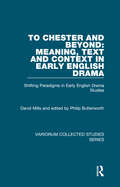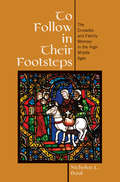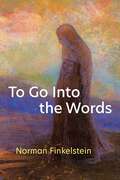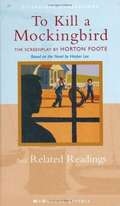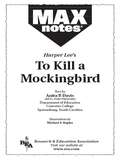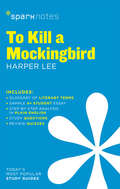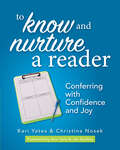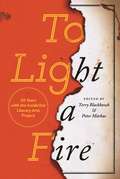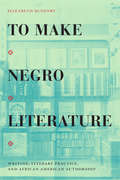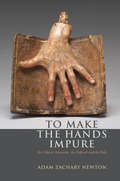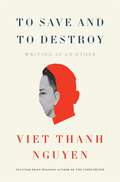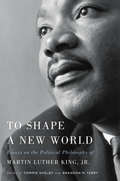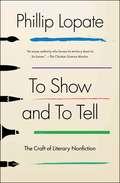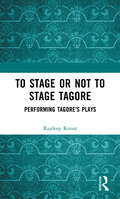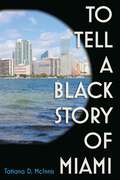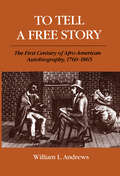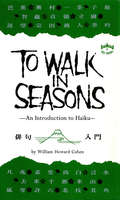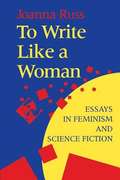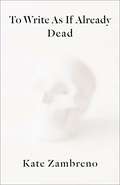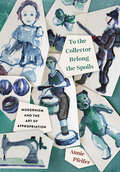- Table View
- List View
To Chester and Beyond: Shifting Paradigms in Early English Drama Studies
by David MillsThis volume brings together a selection of the major articles of David Mills (1938-2013), which along with similar volumes by Alexandra F. Johnston, Peter Meredith and Meg Twycross makes up a set of "Shifting Paradigms in Early English Drama Studies". Mills was one of these four key scholars whose work has changed what is known about English medieval drama and theatre. He made major contributions to understanding English medieval theatre in the widest sense but more specifically to the nature and development of medieval plays and their performance at Chester. The scope of his work from manuscript to performance has created new knowledge and insights brought about by his remarkable technical skill as an editor and researcher. His texts of the Chester Cycle of Mystery Plays have become the standard works. In the light of this outstanding research the volume is comprised of four sections: 1. Editors and Editing; 2. Cultural Contexts; 3. Staging and Performance; 4. Criticism and Evaluation. An editorial introduction opens the work.
To Dance the Dance: A Symbolic Interactional Exploration of Premarital Sexuality (LEA's Series on Personal Relationships)
by F. Scott ChristopherThis pioneering monograph integrates the major research findings of the past four decades and offers a new model for the study of human sexuality. The author examines the empirical literature on sexuality for the developmental stages of childhood, adolescence, and young adulthood and for experiences of sexual aggression. He then uses symbolic interactionism to develop a theoretical model which integrates the research across the developmental periods and for instances of sexual aggression, providing one of the most comprehensive views of sexuality development that has yet been offered. The work investigates the role of family, peers, romantic partners, and personality in the development of sexual expression and offers a unique vision of how symbolic interactionism can inform one's understanding of sexual beliefs and behaviors through the developmental stages. By acknowledging developmental differences and changes in individuals and their interpersonal relationship context, a more integrated understanding emerges of how sexuality develops. This volume is intended for students and scholars interested in the influences on the development of sexual expression of youth and young adults. It will be of great interest to readers in psychology, family studies, communication, sociology, adolescent studies, and specialized areas of sexuality research. It is appropriate for undergraduate seminars and graduate-level courses on human sexuality, close relationships, family theory, sociology, communication, social psychology, developmental psychology, and related areas.
To Follow in Their Footsteps: The Crusades and Family Memory in the High Middle Ages
by Nicholas L. PaulWhen the First Crusade ended with the conquest of Jerusalem in 1099, jubilant crusaders returned home to Europe bringing with them stories, sacred relics, and other memorabilia, including banners, jewelry, and weapons. In the ensuing decades, the memory of the crusaders' bravery and pious sacrifice was invoked widely among the noble families of western Christendom. Popes preaching future crusades would count on these very same families for financing, leadership, and for the willing warriors who would lay down their lives on the battlefield. Despite the great risks and financial hardships associated with crusading, descendants of those who suffered and died on crusade would continue to take the cross, in some cases over several generations. Indeed, as Nicholas L. Paul reveals in To Follow in Their Footsteps, crusading was very much a family affair.Scholars of the crusades have long pointed to the importance of dynastic tradition and ties of kinship in the crusading movement but have failed to address more fundamental questions about the operation of these social processes. What is a "family tradition"? How are such traditions constructed and maintained, and by whom? How did crusading families confront the loss of their kin in distant lands? Making creative use of Latin dynastic narratives as well as vernacular literature, personal possessions and art objects, and architecture from across western Europe, Paul shows how traditions of crusading were established and reinforced in the collective memories of noble families throughout the twelfth and thirteenth centuries. Even rulers who never fulfilled crusading vows found their political lives dominated and, in some ways, directed by the memory of their crusading ancestors. Filled with unique insights and careful analysis, To Follow in Their Footsteps reveals the lasting impact of the crusades, beyond the expeditions themselves, on the formation of dynastic identity and the culture of the medieval European nobility.
To Go Into the Words (Poets On Poetry)
by Norman FinkelsteinTo Go Into the Words is the latest book of critical prose from renowned poet and scholar of Jewish literature Norman Finkelstein. Through a rigorous examination of poets such as William Bronk, Helen Adam, and Nathaniel Mackey, the book engages the contemporary poetic fascination with transcendence through the radical delight with language. By opening up a given poem, Finkelstein seeks the “gnosis” or insight of what it contains so that other readers can understand and appreciate the works even more. Pulling from Finkelstein’s experience of writing thirteen books of poetry and six books of literary criticism, To Go Into the Words consistently rewards the reader with insights as transformative as they are well-considered and deftly mapped out. This volume opens the world of poetry to poets, scholars, and readers by showcasing “the gnosis that is to be found in modern poetry.”
To Kill A Mockingbird: Screenplay And Related Readings
by Harper Lee Horton Foote McDougal-Littell StaffA small-town Southern lawyer loses friends and social position when he defends a black man unjustly accused of rape, but gains the esteem of his motherless children.
To Kill a Mockingbird (Maxnotes Literature Guides)
by Anita Price DavisREA's MAXnotes for Harper Lee's To Kill a Mockingbird MAXnotes offer a fresh look at masterpieces of literature, presented in a lively and interesting fashion. Written by literary experts who currently teach the subject, MAXnotes will enhance your understanding and enjoyment of the work. MAXnotes are designed to stimulate independent thought about the literary work by raising various issues and thought-provoking ideas and questions. MAXnotes cover the essentials of what one should know about each work, including an overall summary, character lists, an explanation and discussion of the plot, the work's historical context, illustrations to convey the mood of the work, and a biography of the author. Each chapter is individually summarized and analyzed, and has study questions and answers.
To Kill a Mockingbird SparkNotes Literature Guide (SparkNotes Literature Guide Series #62)
by SparkNotesTo Kill a Mockingbird SparkNotes Literature Guide by Harper Lee Making the reading experience fun! When a paper is due, and dreaded exams loom, here's the lit-crit help students need to succeed! SparkNotes Literature Guides make studying smarter, better, and faster. They provide chapter-by-chapter analysis; explanations of key themes, motifs, and symbols; a review quiz; and essay topics. Lively and accessible, SparkNotes is perfect for late-night studying and paper writing. Includes:An A+ Essay—an actual literary essay written about the Spark-ed book—to show students how a paper should be written.16 pages devoted to writing a literary essay including: a glossary of literary termsStep-by-step tutoring on how to write a literary essayA feature on how not to plagiarize
To Know and Nurture a Reader: Conferring with Confidence and Joy
by Christina Nosek Kari YatesConferring with students about reading allows for clearer access to one-on-one, in-the-moment teaching and learning, yet it can feel intimidating or overwhelming. Kari Yates and Christina Nosek want to help. Here they have provided practical, reflective, student-centered teaching moves that you can use to develop an intentional, joy-filled conferring practice.To Know and Nurture a Reader: Conferring with Confidence and Joy is a get-going guide to conferring. The book includes step-by-step guidance that is also considerate of time and other classroom challenges, as well as: Numerous tools such as guiding questions, reproducible planning and note-taking documents;Classroom vignettes that pull you close to a reader and teacher in a conference setting;Video clips of classroom conferences to show what conferring looks like in action. The book breaks conferring into manageable chunks with specific goals for knowing and nurturing young readers, then puts all the pieces together with various classroom scenarios and examples. The tools, examples, and ideas in this book make conferring something every teacher can do right away and master with continued effort and practice.
To Light a Fire: 20 Years with the InsideOut Literary Arts Project (Made in Michigan Writers Series)
by Peter Markus Terry BlackhawkThe InsideOut Literary Arts Project (iO) began in 1995 in five Detroit high schools, with weekly classroom visits by a writer-in-residence, the publication of a literary journal for each school, and the mission of encouraging students to use poetry to "think broadly, create bravely, and share their voices with the wider world." Twenty years later, the program serves some five thousand K-12 students per year, has received national exposure and accolades (including a recent visit to the White House), and has seen numerous student writers recognized for their creativity and performance. In To Light a Fire: 20 Years with the InsideOut Literary Arts Project, founding director Terry Blackhawk and senior writer Peter Markus collect the experiences of writers who have participated in InsideOut over the years to give readers an inside look at the urban classroom and the creative spark of Detroit's students.In short and insightful essays, contributors discuss how iO's creative magic happened during the course of their work in Detroit schools. Poets such as Jamaal May, John Rybicki, Robert Fanning, and francine j. harris describe the many ways that poetry can be used as a tool to reach others, and how poetic work shaped them as teachers in return. Contributors describe nurturing a love of language, guiding excursions into imagination, and helping students find their own voices. They also describe the difficulties of getting through to kids, the challenges of oversized classrooms, and of working with children who seem to have been forgotten. Despite their own frequent angst and personal uncertainties about doing the right thing, they describe the joys and rewards that come from believing in students and supporting the risks that they take as writers. To Light a Fire captures the story--one poet, poem, and poetic moment at a time--of helping students to discover they can imagine, dream, and speak in a way that will make people listen. Fellow educators, poets, and creative writers will be moved and inspired by this collection.
To Make Negro Literature: Writing, Literary Practice, and African American Authorship
by Elizabeth McHenryIn To Make Negro Literature Elizabeth McHenry traces African American authorship in the decade following the 1896 legalization of segregation. She shifts critical focus from the published texts of acclaimed writers to unfamiliar practitioners whose works reflect the unsettledness of African American letters in this period. Analyzing literary projects that were unpublished, unsuccessful, or only partially achieved, McHenry recovers a hidden genealogy of Black literature as having emerged tentatively, laboriously, and unevenly. She locates this history in books sold by subscription, in lists and bibliographies of African American authors and books assembled at the turn of the century, in the act of ghostwriting, and in manuscripts submitted to publishers for consideration and the letters of introduction that accompanied them. By attending to these sites and prioritizing overlooked archives, McHenry reveals a radically different literary landscape, revising concepts of Black authorship and offering a fresh account of the development of “Negro literature” focused on the never published, the barely read, and the unconventional.
To Make the Hands Impure: Art, Ethical Adventure, the Difficult and the Holy
by Adam Zachary NewtonHow can cradling, handling, or rubbing a text be said, ethically, to have made something happen? What, as readers or interpreters, may come off in our hands in as we maculate or mark the books we read?For Adam Zachary Newton, reading is anembodied practice wherein “ethics” becomes a matter of tact—in the doubled sense of touch and regard. With the image of the book lying in the hands of its readers as insistent refrain, To Make the Hands Impure cuts a provocative cross-disciplinary swath through classical Jewish texts, modern Jewish philosophy, film and performance, literature, translation, and the material text.Newton explores the ethics of reading through a range of texts, from the Talmud and Midrash to Conrad’s Nostromo and Pascal’s Le Mémorial, from works by Henry Darger and Martin Scorsese to the National September 11 Memorial and a synagogue in Havana, Cuba. In separate chapters, he conducts masterly treatments of Emmanuel Levinas, Mikhail Bakhtin, and Stanley Cavell by emphasizing their performances as readers—a trebled orientation to Talmud, novel, and theater/film. To Make the Hands Impure stages the encounter of literary experience and scriptural traditions—the difficult and the holy—through an ambitious, singular, and innovative approach marked in equal measure by erudition and imaginative daring.
To Pray as a Jew: A Guide to the Prayer Book and the Synagogue Service
by Hayim H. DoninA distinguished guide to Jewish prayerWhy do Jews pray? What is the role of prayer in their lives as moral and ethical beings? From the simplest details of how to comport oneself on entering a synagogue to the most profound and moving comments on the prayers themselves, Rabbi Hayim Halevy Donin guides readers of To Pray as a Jew through the entire prescribed course of Jewish liturgy, passage by passage, ritual by ritual, in this handsome and indispensable guide to Jewish prayer. Unexcelled for beginners as well as the religiously observant, To Pray as a Jew is intended to show the way, to enlighten, and hopefully to inspire.
To Read Literature (Third Edition)
by Donald HallThis book introduces the three principal types or genres of literature: fiction, poetry, and drama in a way that helps students read literature with pleasure, intelligence, and discrimination.
To Save and to Destroy: Writing as an Other (The Charles Eliot Norton Lectures)
by Viet Thanh NguyenFrom the Pulitzer Prize–winning author of The Sympathizer (now an HBO series) comes a moving and unflinchingly personal meditation on the literary forms of otherness and a bold call for expansive political solidarity.Born in war-ravaged Vietnam, Viet Nguyen arrived in the United States as a child refugee in 1975. The Nguyen family would soon move to San Jose, California, where the author grew up, attending UC Berkeley in the aftermath of the shocking murder of Vincent Chin, which shaped the political sensibilities of a new generation of Asian Americans.The essays here, delivered originally as the prestigious Norton Lectures, proffer a new answer to a classic literary question: What does the outsider mean to literary writing? Over the course of six captivating and moving chapters, Nguyen explores the idea of being an outsider through lenses that are, by turns, literary, historical, political, and familial.Each piece moves between writers who influenced Nguyen’s craft and weaves in the haunting story of his late mother’s mental illness. Nguyen unfolds the novels and nonfiction of Herman Melville, F. Scott Fitzgerald, Ralph Ellison, William Carlos Williams, and Maxine Hong Kingston, until aesthetic theories give way to pressing concerns raised by war and politics. What is a writer’s responsibility in a time of violence? Should we celebrate fiction that gives voice to the voiceless—or do we confront the forces that render millions voiceless in the first place? What are the burdens and pleasures of the “minor” writer in any society? Unsatisfied with the modest inclusion accorded to “model minorities” such as Asian Americans, Nguyen sets the agenda for a more radical and disquieting solidarity with those whose lives have been devastated by imperialism and forever wars.
To Shape a New World: Essays on the Political Philosophy of Martin Luther King, Jr.
by Tommie ShelbyOn the 50th anniversary of Martin Luther King, Jr.’s, assassination, his political thought remains underappreciated. Tommie Shelby and Brandon Terry, along with a cast of distinguished contributors, engage critically with King’s understudied writings on a wide range of compelling, challenging topics and rethink the legacy of this towering figure.
To Show and to Tell: The Craft of Literary Nonfiction
by Phillip LopateDistinguished author Phillip Lopate, editor of the celebrated anthology The Art of the Personal Essay, is universally acclaimed as "one of our best personal essayists" (Dallas Morning News). Here, combining more than forty years of lessons from his storied career as a writer and professor, he brings us this highly anticipated nuts-and-bolts guide to writing literary nonfiction. A phenomenal master class shaped by Lopate's informative, accessible tone and immense gift for storytelling, To Show and To Tell reads like a long walk with a favorite professor--refreshing, insightful, and encouraging in often unexpected ways.FAs. An award-winning essayist and author himself, Lopate brings vividly into focus the true lifeblood of writing: exploration of one's innermost thoughts, feelings, and perceptions, and the art of thinking, engagingly, on the page. With his guidance, writers in every field and at every stage of their careers are certain to learn a thing or two.
To Stage or Not to Stage Tagore: Performing Tagore's Plays
by Rajdeep KonarRabindranath Tagore (1861‒1941) was a prolific playwright with more than thirty plays to his credit. He is also known for his life-long, passionate engagement with theatre, first at Jorasanko and then at Santiniketan, in multiple roles as actor, director, singer, musician. However, during his own life-time and even after his demise, his experimental plays have proved challenging for directors to stage. Time and again they have been written off as unstageable by prominent theatre makers. Further complications have arisen from the presence of a spectre of authority around Tagore and his plays often promoted by Visva-Bharati, the institution he founded and which held the copyright of his works till 2001. This book travels through time and space intending to untangle the enigma presented by Tagore’s plays. The book on one hand immerses itself into the archive of Tagore’s plays and his dramaturgy of them in order to problematize the ways in which they have been interpreted. On the other, it also engages with productions of Tagore’s plays during and after his life-time to understand the challenges directors have faced while staging them and the strategies they have embraced to circumvent them. While performing a subjective critical reading of the Tagore theatre-archive, an underlying objective of the book remains to understand the very concept of the archive, as it manifests itself in contemporary dramatic theatre.
To Tell a Black Story of Miami
by Tatiana D. TatianaHow portrayals of anti-Blackness in literature and film challenge myths about South Florida history and culture In this book, Tatiana McInnis examines literary and cultural representations of Miami alongside the city’s material realities to challenge the image of South Florida as a diverse cosmopolitan paradise. McInnis discusses how this favorable “melting pot” narrative depends on the obfuscation of racialized violence against people of African descent.Analyzing novels, short stories, and memoirs by Edwidge Danticat, M.J. Fievre, Carlos Moore, Carlos Eire, Patricia Stephens Due, and Tananarive Due, as well as films such as Dawg Fight and Moonlight, McInnis demonstrates how these creations push back against erasure by representing the experiences of Black Americans and immigrants from Caribbean nations. McInnis considers portrayals of state-sanctioned oppression, residential segregation, violent detention of emigres, and increasing wealth gaps and concludes that celebrations of Miami’s diversity disguise the pervasive, adaptive nature of white supremacy and anti-Blackness.To Tell a Black Story of Miami offers a model of how to use literature as a primary archive in urban studies. It draws attention to the similarities and divergences between Miami’s Black diasporic communities, a historically underrepresented demographic in popular and scholarly awareness of the city. Increasing understanding of Miami’s political, social, and economic inequities, this book brings greater nuance to traditional narratives of exceptionalism in cities and regions. Publication of this work made possible by a Sustaining the Humanities through the American Rescue Plan grant from the National Endowment for the Humanities.
To Tell a Free Story: The First Century of Afro-American Autobiography, 1760-1865
by William L. AndrewsTo Tell A Free Story traces in unprecedented detail the history of Black autobiography from the colonial era through Emancipation. Beginning with the 1760 narrative by Briton Hammond, William L. Andrews explores first-person public writings by Black Americans. Andrews includes but also goes beyond slave narratives to analyze spiritual biographies, criminal confessions, captivity stories, travel accounts, interviews, and memoirs. As he shows, Black writers continuously faced the fact that northern whites often refused to accept their stories and memories as sincere, and especially distrusted portraits of southern whites as inhuman. Black writers had to silence parts of their stories or rely on subversive methods to make facts tellable while contending with the sensibilities of the white editors, publishers, and readers they relied upon and hoped to reach.
To The Point: Reading and Writing Short Argument
by Gilbert H. Muller Harvey S. WienerTo the Point helps readers construct arguments by thinking about their own experiences, reading brief, current essays, and doing writing assignments.
To Walk in Seasons: An Introduction to Haiku
by William Howard CohenTo Walk in Seasons is designed to help the beginner discover haiku for himself, and eventually create his own haiku poems.It includes a lively and sensitive introduction on the nature of haiku.<P><P> For individual study, or for use in the classroom, it also contains a study guide aimed at recreating the thought processes behind this terse, concentrated form. Mr. Cohen's poetry like his anthology illuminates poetic experience:To walk in seasonsis to discover what's insidea split instantTo walk in seasons;passing through a dry gateinto a rainstorm.To walk in seasons is to wake andfind you really are.Mr. Cohen's haiku and other poems have appeared in many well-known literary periodicals such as Literature East and West and American Haiku. He is the author of The Hill Way Home and A House in the Country, and his works have been praised by such eminent poets as Peter Viereck and Mark Van Doren. (He was elected in 1963 to membership in the Poetry Society of America) Mr. Cohen won the title of United States Olympic Poet, representing the United States in Mexico City in 1968, and in 1969 he honored at the World Congress of Poets in Manila.
To Walt Whitman, America
by Kenneth M. PriceWalt Whitman "is America," according to Ezra Pound. More than a century after his death, Whitman's name regularly appears in political speeches, architectural inscriptions, television programs, and films, and it adorns schools, summer camps, truck stops, corporate centers, and shopping malls. In an analysis of Whitman as a quintessential American icon, Kenneth Price shows how his ubiquity and his extraordinarily malleable identity have contributed to the ongoing process of shaping the character of the United States.Price examines Whitman's own writings as well as those of writers who were influenced by him, paying particular attention to Whitman's legacies for an ethnically and sexually diverse America. He focuses on fictional works by Edith Wharton, D. H. Lawrence, John Dos Passos, Ishmael Reed, and Gloria Naylor, among others. In Price's study, Leaves of Grass emerges as a living document accruing meanings that evolve with time and with new readers, with Whitman and his words regularly pulled into debates over immigration, politics, sexuality, and national identity. As Price demonstrates, Whitman is a recurring starting point, a provocation, and an irresistible, rewritable text for those who reinvent the icon in their efforts to remake America itself.
To Write Like A Woman: Essays In Feminism And Science Fiction
by Joanna RussClassic essays on science fiction and feminism by Nebula and Hugo award-winning Joanna Russ. Here she ranges from a consideration of the aesthetic of science fiction to a reading of the lesbian identity of Willa Cather. To Write Like a Woman includes essays on horror stories and the supernatural, feminist utopias, popular literature for women (the "modern gothic"), and the feminist education of graduate students in English.
To Write as if Already Dead (Rereadings)
by Kate ZambrenoTo Write As If Already Dead circles around Kate Zambreno’s failed attempts to write a study of Hervé Guibert’s To the Friend Who Did Not Save My Life. In this diaristic, transgressive work, the first in a cycle written in the years preceding his death, Guibert documents with speed and intensity his diagnosis and disintegration from AIDS and elegizes a character based on Michel Foucault.The first half of To Write As If Already Dead is a novella in the mode of a detective story, searching after the mysterious disappearance of an online friendship after an intense dialogue on anonymity, names, language, and connection. The second half, a notebook documenting the doubled history of two bodies amid another historical plague, continues the meditation on friendship, solitude, time, mortality, precarity, art, and literature.Throughout this rigorous, mischievous, thrilling not-quite study, Guibert lingers as a ghost companion. Zambreno, who has been pushing the boundaries of literary form for a decade, investigates his methods by adopting them, offering a keen sense of the energy and confessional force of Guibert’s work, an ode to his slippery, scarcely classifiable genre. The book asks, as Foucault once did, “What is an author?” Zambreno infuses this question with new urgency, exploring it through the anxieties of the internet age, the ethics of friendship, and “the facts of the body”: illness, pregnancy, and death.
To the Collector Belong the Spoils: Modernism and the Art of Appropriation
by Annie PfeiferTo the Collector Belong the Spoils rethinks collecting as an artistic, revolutionary, and appropriative modernist practice, which flourishes beyond institutions like museums or archives. Through a constellation of three author-collectors—Henry James, Walter Benjamin, and Carl Einstein—Annie Pfeifer examines the relationship between literary modernism and twentieth-century practices of collecting objects. From James's paper hoarding to Einstein's mania for African art and Benjamin's obsession with old Russian toys, she shows how these authors' literary techniques of compiling, gleaning, and reassembling constitute a modernist style of collecting which that reimagines the relationship between author and text, source and medium. Placing Benjamin and Einstein in surprising conversation with James sharpens the contours of collecting as aesthetic and political praxis underpinned by dangerous passions. An apt figure for modernity, the collector is caught between preservation and transformation, order and chaos, the past and the future.Positing a shadow history of modernism rooted in collection, citation, and paraphrase, To the Collector Belong the Spoils traces the movement's artistic innovation to its preoccupation with appropriating and rewriting the past. By despoiling and decontextualizing the work of others, these three authors engaged in a form of creative plunder that evokes collecting's long history in the spoils of war and conquest. As Pfeifer demonstrates, more than an archive or taxonomy, modernist collecting practices became a radical, creative endeavor—the artist as collector, the collector as artist.
